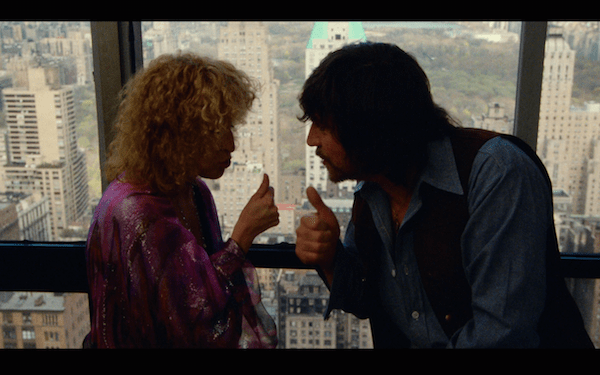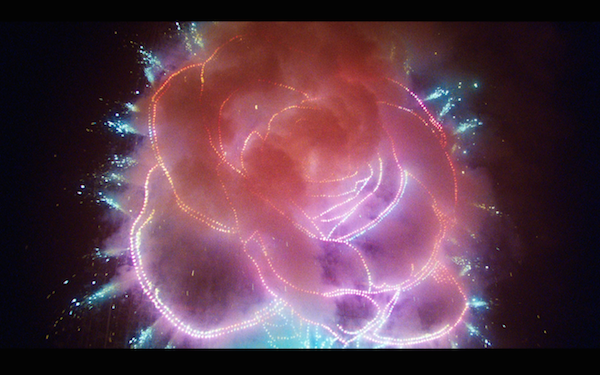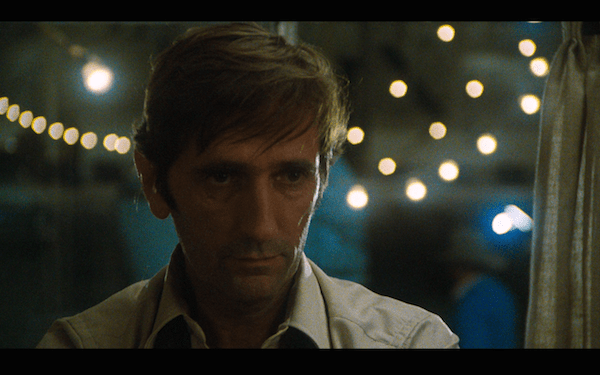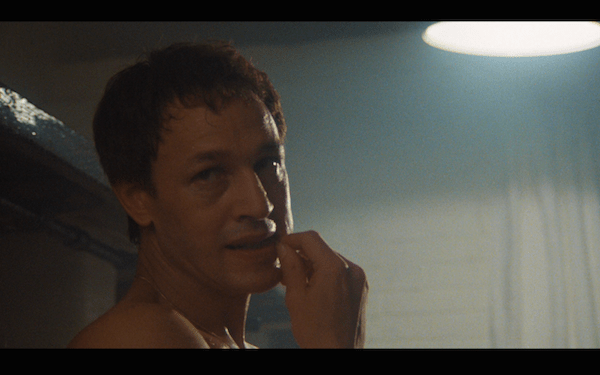The Rose, 1979, Mark Rydell

I have been aware of The Rose for most of my life. People had talked about it at various stages, but I made an unconscious decision not to see it. Why? Maybe because I loved Janis Joplin and disliked Bette Midler, so the burning desire wasn’t there. It wasn’t anything about Midler’s acting ability or talents, just that I was certainly not the target market for the remainder of her career. The fact that it was not really about Janis turned me off more than anything else. Having now seen it many years later, I’m actually glad I waited.
First off, this is not about Janis Joplin. In many of the supplements, this is stated and re-stated, and it is unfair to the film to get hung up on her life being the template for the plot. It is only the broad strokes that relate to Janis. This film is about the plight of the rock and roll star, the insatiable need for the rush of attention that one gets onstage, the insecurity off the stage, and the self-destruction in between. The only time that Janis is recollected is in the performances, yet not all of them. Most of the performances are all Bette channeling a 70s rock-starlet persona.
What stands out about the film is the cinematography. From the early scene in a building that towers above Central Park in New York City, to the kaleidoscope of images and colors that are captured in the live performance, every frame looks fantastic. Vilmos Zsigmond is responsible for the majority of the film’s appearance, but he also recruited some of the best in the industry to capture the concert sequences. Rather than go into specifics, I recommend you read Adam Batty’s post about The Eyes Behind The Rose.
The Rose shouts out at a concert that she keeps herself in shape through “Drugs, sex and rock n’ roll!” The order in which she places the words is telling. Most people refer to that era as “Sex, drugs and rock n’roll.” One of The Rose’s problems was that, despite her fame, she was not able to “get laid.” She expresses this directly in the early meeting with Rudge (Alan Bates). We don’t see her delve deeply into drugs until towards the end, which is what initiates her downfall, but the sex and subsequent rejection leads her to search for an escape. Rock n’ roll was last on her priority list because it really was. She was exhausted from all the touring and performing, and desperately wanted a break. Her mental stability was wearing down due to the lifestyle, yet Rudge trapped her. Her desire for the limelight and attention also trapped her. In many ways, rock n’ roll was her drug, only it was not giving her the same high it did before.
Deep down, The Rose simply wants to be appreciated. She’s shy, insecure, and in a lot of ways neurotic. The stage is the only place where she really belongs, where she feels appreciated. One recurring theme is her constant rejection. It begins with Billy Ray (Harry Dean Stanton) not so politely asking her not to sing his songs. Later in her hometown, she is recognized in a familiar shop owner in her hometown as Mary Rose and not “THE” Rose.
Redemption comes her way through Huston Dyer (Frederic Forrest), a limo driver who she steals from Billy Ray and takes on a wild misadventure of sex and shenanigans. Huston, however, is from a different world. He’s actually a deserter from the Army, and cannot relate to the “drugs, sex and rock n’ roll” lifestyle. What they have in common is that he is a deserter, and she wants to leave her rock career at least temporarily, and into his arms seems the most appropriate place to hide. Huston does not approve of what she’s doing to herself, and this comes to a head in the powerful bathhouse scene where he finally lets loose. He comes back to the fold, but the old magic has gone.
The Rose is a mess. “Do I look old?” she asks at one time. She is yearning for any sign of vitality, yet she finds none unless she is on-stage. The breaking point is when Rudge strong-arms her as a power contract ploy and cancels her hometown show. This smoking gun transforms her from a slow descent to a spiraling downfall. She takes solace in every chemical she can find, trying to find a chemically induced feeling that rivals what she feels onstage or in Huston’s arms. When some demons come back to haunt her, she finally caves, only it is too late. The damage has been done. That is the tragic reality of some rock n’ roll lifestyles. Again, even though this movie was not about Janis, her tragic reality is the backbone. The Rose’s downfall is just as tragic, even if fictional.
The performances are truly what makes the film worth watching. Midler owns her role as The Rose, and I was impressed that the star of Beaches was able to convincingly play a rock n’ roll star. Forrest as Huston also shines in the scenes where he gets to be the voice of reason. Even Alan Bates as Rudge does a fine job with what is essentially a flat character. Some of the dramatic choices are a stretch and at times the film gets heavy-handed, but overall it is a worthwhile character exploration.
Film Rating: 7/10
Supplements
Commentary: Mark Rydell from 2003.
- The band was put together with Rydell, Paul Rothchild, and Bette Midler. They were a real band that played real stories.
- This was NOT the Janis Joplin story as Rydell emphatically states. It was a character based on some of the rock stars in history. It was conceived as biography of her for years. They made a fictional character using the dramatic elements of Joplin’s life that were dramatic and fitting, and invented the rest.
- They shot real concerts, twice at two hours without interruption. There were no interruptions and Bette was really playing to the crowd. These shows were later cut together for the film.
- Bathhouse scene was unheard of. All that male nudity, even if not shown, was shocking for the time.
- Rydell spends a lot of time gushing about the actors. They all exceeded his expectations.
One thing I like about this commentary is that Rydell lets the film breathe. He stays out during important moments, so it’s almost as if watching the film again. He interjects only when he has something worth saying. Sometimes I prefer this sort of commentary to one with endless chatter.
Bette Midler: Interview from 2015.
At first she didn’t want to do it. She was a Joplin fan and didn’t want to tarnish her legacy, so they changed it from being inspired by Joplin and not telling the complete story. She started gymnastics for her stage moves. Wanted to get a panther quality to her moves, “a violent creature” on stage.
She praises Forrest in particular. She thought he did a great job at being patient. She wasn’t prepared for Harry Dean Stanton. He was tough. Everyone wanted her to succeed (except for Harry Dean.) They were supportive, and it was “joyful and full of love.” She remembers it more than most of her movies.
Mark Rydell: Interview in 2014.
He also didn’t want to do a straight Joplin biopic. People recommended Bette Midler and he knew she was perfect when he saw the dailies. She had sung in men’s bathhouses, so they incorporated it into the movie.
Aaron Russo was her manager and was very controlling. “You talk to me before you talk to Bette.” He called the police and got him out of there. Bette got him out of the way then and that began his relationship with Bette.
He talks at length about all the amazing Directors of Photography that he used for the concert footage. He needed nine cameras for these scenes. He asked Zsigmond to pick the best cameramen in town, and somehow he succeeded in getting the the giants of the era.
There were 6,000 people at the concert, who came out because of a radio announcement. They were told not to react unless the performer makes them react. She brought it. “That’s why the concert felt so alive, because they were alive.”
Vilmos Zsigmond: He speaks with cinematographer John Bailey in 2014.
The opening shot was in the Hilton in downtown NYC. It was difficult to light because they had to be careful of the backlighting in the windows.
Of course he also talks about the concert scenes. They lit them differently because they shot them on the same stage. They did the overhead helicopter shot, carefully lit it up, and did so to show the popularity and stature of The Rose. They did a lot of improvising with the shots because the performances were improvised. In addition to the star cinematographers, he also used Dave Myers, who was a big concert photographer, who famously shot Woodstock.
He thinks that the craft is diminishing, and that the concept of lighting is being lost. Too many people are becoming cinematographers. He is trying to teach the youngsters that are using digital cameras to go look at the old films, see how they are lit. Don’t get lazy by how easy the digital camera is to use.
Today Show: Tom Brokaw with Rydell and Midler in 1978.
It shows behind the scenes of them shooting the scene where she leaves a news conference, take after take. Brokaw interviews Rydell and he gives overwhelming praise to Midler for her performance.
Gene Shalit & Bette Midler: Interviews from 1979.
He asks the question about Janis Joplin, comparing the fact that Janis is 1960s whereas Bette is 1970s. Bette said that she did not intend to become Janis. She contrasts the differences. She is a New Yorker, which is a bombarding culture, but she played a Californian, which is more of a laid back atmosphere.
Janis Joplin, Tina Turner and Aretha Franklin inspired her. She saw them all in the same week in the 1960s and that was the turning point.
It is interesting hearing her reflect on her career, which is something she had just started thinking about recently. She says she would be happy if she retired tomorrow. Of course there were would be plenty more to come.
Criterion Rating: 8/10
Posted on June 19, 2015, in Criterions, Film and tagged alan bates, bette midler, celebrity, criterion, film, Frederic Forrest, harry dean stanton, janis joplin, mark rydell, rock n' roll, the criterion collection, Vilmos Zsigmond. Bookmark the permalink. Leave a comment.










Leave a comment
Comments 0